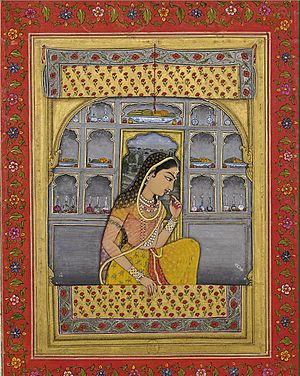Padmavati facts for kids
Quick facts for kids Padmavati |
|
|---|---|

An 18th-century painting of Padmini.
|
|
| Information | |
| Title | Rani of Mewar |
| Spouse(s) | Ratan Sen |
| Religion | Hinduism |
Padmini, also known as Padmavati, was a famous Indian queen (Rani) from the 13th or 14th century. Her story is mostly a legend, meaning it's a very old tale passed down through time. The earliest written story about her is an epic poem called Padmavat.
This poem was written in 1540 CE by a poet named Malik Muhammad Jayasi. In Jayasi's poem, Padmavati was a very beautiful princess from the Singhal kingdom, which is now Sri Lanka. A talking parrot named Hiraman told Ratan Sen, the Rajput ruler of Chittor Fort, about her beauty. Rajputs were brave warriors and rulers in India.
After a long adventure, Ratan Sen married Padmavati and brought her to Chittor. Alauddin Khalji, the Sultan (ruler) of Delhi, also heard about her beauty. He decided to attack Chittor Fort to try and get her. This attack is called a siege.
Many things happened during the siege. Eventually, the fort was captured. During this time, Ratan Sen was killed in a fight with Devpal, the king of Kumbhalner. Before Alauddin Khalji could take over Chittor, Padmavati and her friends made a brave choice. They performed Jauhar, which was a ritual where women sacrificed themselves to protect their honor. After this, the Rajput men fought bravely until they died on the battlefield.
Contents
The Story of Rani Padmini
The story of Rani Padmini is a famous legend from India. It tells about a brave queen and her fight to protect her people and her honor. This tale has been told in many ways over hundreds of years.
The Poem of Padmavat
The most well-known version of Padmini's story comes from the poem Padmavat. This poem was written by Malik Muhammad Jayasi in the 1500s. It describes Padmavati as a princess from a faraway island.
In this poem, a talking parrot helps the ruler of Chittor, Ratan Sen, find Padmavati. He travels a long way to marry her and bring her back to his kingdom. Their story is full of adventure and challenges.
The Siege of Chittor
The story continues with Alauddin Khalji, a powerful ruler from Delhi. He hears about Padmavati's beauty and decides he wants her. So, he gathers his army and attacks Chittor Fort. This attack is known as a siege.
During the siege, there are many battles. The people of Chittor fight bravely to defend their home. The story describes the difficult times they faced during this long attack.
A Brave Sacrifice
In the legend, Ratan Sen dies during the siege. To protect their honor and avoid being captured, Rani Padmavati and other women of the fort make a very brave and difficult decision. They perform Jauhar, a ritual of self-sacrifice. This act showed their courage and determination. After this, the Rajput soldiers fought their last battle.
Different Versions of the Story
There are many other versions of Rani Padmini's story. These versions are found in different traditions, including Hindu and Jain stories. They often tell the tale a bit differently from Jayasi's poem.
Hindu and Jain Tales
In some of these other versions, Rani Padmini's husband, Ratan Sen, dies fighting Alauddin Khalji's army. After his death, she leads the Jauhar. These stories often show her as a brave Hindu Rajput queen. She is seen as someone who defended her honor against an invader.
Padmini in Modern Times
Over time, Rani Padmini became a very important figure in Indian history and culture. Many people believed she was a real person. Her story has been told in many ways, including:
- Novels (books)
- Plays (for the stage)
- Television shows
- Movies
Is the Story True?
While Alauddin Khalji's attack on Chittor in 1303 CE was a real historical event, many historians today question the story of Padmini. They believe that the legends about her might not be entirely true. Historians study old texts and evidence to understand the past. They think that the story of Padmini might be a fictional tale that became very popular.
 | Delilah Pierce |
 | Gordon Parks |
 | Augusta Savage |
 | Charles Ethan Porter |

